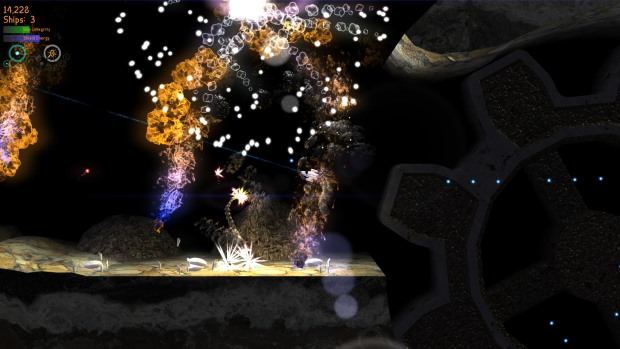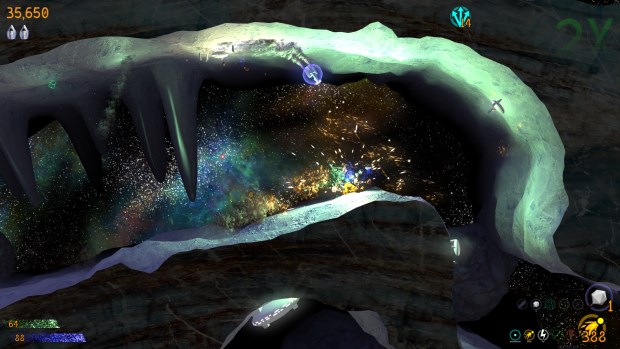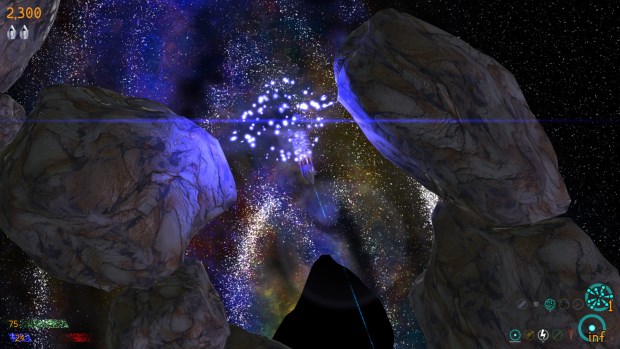Back in the 80’s games were hard. Really hard. In recent years only a few games have come anywhere near the same difficulty levels but usually when they do they enjoy both critical and commercial success. Retrobooster is just as hard as any of them, and will even give some of the classic 80s titles a run for their money.
Retrobooster is a 2.5D space shooter that sees you navigate your very responsive, ship through puzzles, hundreds of enemies and a fair share of what seem like impossible-to-escape caves. Each level is unique in its own way; some will have heavy puzzle elements whilst others will have legions of enemies to clear out. The differences between them mean that no two levels ever feel the same, and they are always throwing new ideas your way.

The puzzle style levels are where the game really excels. Barriers are used to prevent you from accessing certain areas, or to only allow you to travel one way. The strategic placing of these barriers along with switches and closed doors result in some complex puzzles that may leave you stumped for quite a while.
The majority of the levels will have some puzzle element in them, but most only involve finding a switch or even just finding the exit. The maze-like caves and the abundance of enemies are what make many of the levels challenging. Enemies are extremely difficult to kill, even in the early game, and their attacks do a lot of damage. For the most part they can be avoided, but if you want to go for a high score, you best start destroying them all.
Navigating through each level, in the early stages, can be quite a challenge as the controls take a long time to get used to. On paper they are relatively simple, but the detailed physics and overly-responsive ship make it near impossible not to crash. There is a very steep learning curve associated with the controls, but once you manage to master them the game becomes a lot easier and more enjoyable – although it may take some a few hours to get to this stage.

Retrobooster has a very impressive physics engine. According to the developer, gravity is the only force acting on the ship naturally which means theoretically there is no limit to the speed your ship can travel, unlike in many similar games. The gravity can be used in your favor as it becomes especially useful when trying to collect humans off the ground; but it can also be your worst enemy, leading you into rocks on numerous occasions.
The combination of the physics, challenging controls, cleverly designed caves and the powerful enemies lead to very difficult game, but not one that ever becomes overly frustrating. 9 times out of 10 every death will either be because of a mistake you made or because of a bad situation, and it’s very rare you’ll feel you’ve been cheated by the game.
Retrobooster isn’t a single player only experience; split screen multiplayer is also on offer. All levels can be completed cooperatively with a friend, but the real multiplayer fun is in the fairly self-explanatory Deathmatch mode. Up to four people can play at once and the competitiveness will soon come out when the action starts.

Despite the complex physics and great levels the artwork leaves quite a bit to be desired. The ship itself is very basic and the enemies and environments are not brilliant either. The explosions and particle effects of the ship’s thrusters are good and even look slightly realistic, but the rest of the artwork is basic at best. The electronic soundtrack and bare bones yet quite humorous story do a good job but are not particularly memorable.
VERDICT: Retrobooster is a very difficult game, but is still highly enjoyable. Once you master the controls the game becomes a lot easier and a lot more enjoyable. The levels are intelligently designed and the variety makes each one feel like a totally new experience. The art, soundtrack and story may not be the best, but the gameplay and incredibly fun multiplayer make up for it.

GOOD. A game that scores 7/10 is worthy of note, but unworthy of fanfare. It does many things well, but only a few of them incredibly well and, despite a handful of good qualities, fresh ideas and solid mechanics, it fails to overwhelm.
Review code provided by publisher.





